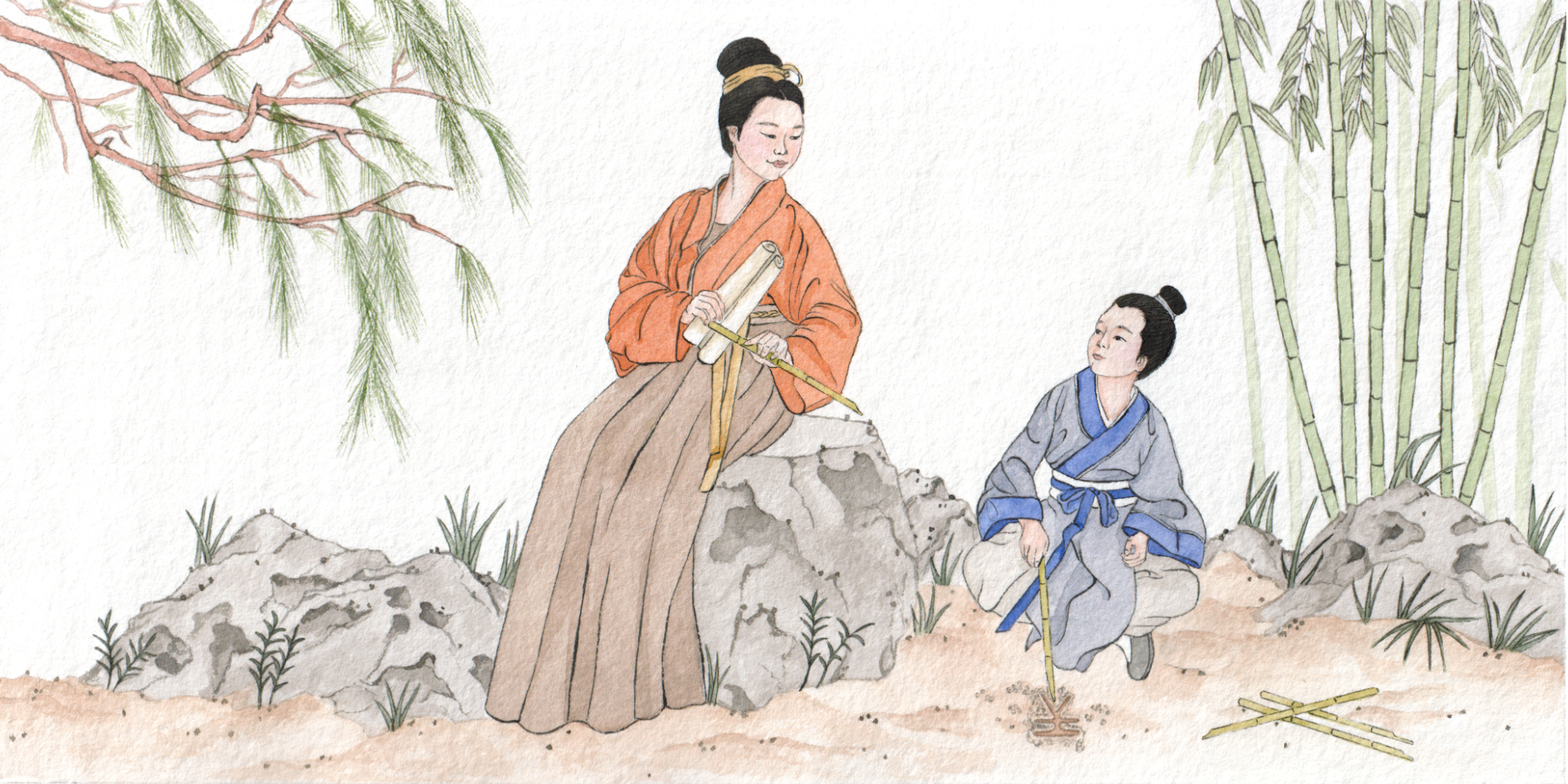
The Mother of Ouyang, One of the Four Virtuous Mothers
Evan Mantyk, Contributing Editor
In traditional Chinese culture, the family is considered the birthplace of virtue and maternal education is a source of peace. Zheng, one of the four great virtuous mothers in Chinese history, never forgot her late husband's aspirations. She raised her son, Ouyang Xiu, with moral integrity, nurturing and educating him as he grew up to be an eminent writer and statesman. She left behind the timeless reputation of "writing with a reed to teach a child."
Ouyang Xiu, a literary giant of the Northern Song Dynasty, was ranked among the Eight Masters of Tang and Song Prose. His father, Ouyang Guan, was a government official. When Ouyang Xiu was four years old, his father passed away. Ouyang Guan was known for his integrity and generosity, but his family was left in poverty upon his death, leaving his wife Zheng alone to raise their young son at the age of twenty-nine, "without a roof over their heads or a field to cultivate." Reluctantly, Zheng sought refuge with Ouyang Xiu's uncle, living as dependents.
Despite their poverty, Zheng tirelessly supported herself and bore the burden of raising her child alone. She spared no effort in educating her son. When Ouyang Xiu approached school age, Zheng began teaching him to read and write. Unable to afford pen and ink, Zheng made pens from reeds and used sand as paper for Ouyang Xiu to practice writing. This is the origin of the idiom "writing with a reed to teach a child."
Zheng also often recited ancient writings to her son as part of his literary enlightenment. As Ouyang Xiu grew older, Zheng borrowed books from local scholars for him to read and copy down exemplary works. Often, before he finished copying, Ouyang Xiu could already recite the entire book. Thus, from a young age, Ouyang Xiu extensively read various works, often neglecting sleep and food to study. His poetry and essays, even in his youth, were comparable to those of adults.
Of course, if Zheng had only taught her son to read and write, she would not have earned the title of "virtuous mother." Zheng's greatness lay in her constant emphasis on moral integrity, teaching her son benevolence, filial piety, and frugality. She especially used the virtuous deeds and words of her late husband to educate her son. Thus, although Ouyang Xiu never had the chance to hear his father's teachings directly, he was often influenced by his father's virtues, which were deeply embedded in his heart and benefited him throughout his life.
The first lesson Zheng taught her son was to be indifferent to fame and wealth. She told Ouyang Xiu, "Your father was very honest when he was an official, and he was also charitable and loved making friends. Although his salary was meager, he never hoarded wealth. He often said, 'I won't let money become a burden to me.'" Later, when Ouyang Xiu achieved success and wealth, he lived a modest life. Zheng's character was noble, content with poverty, and unaffected by fame and wealth.
Zheng also often spoke to her son about his father's filial piety. She said, "When I married into the family, your grandmother had passed away, and your father had just completed his mourning period. Whenever he worshiped his parents, he would shed tears and say, 'No matter how rich the offerings are during the worship, it cannot make up for the regretfully meager care I gave them during their lifetime.' Occasionally, when he enjoyed some good wine and food, he would also shed tears, saying, 'In the past, my mother lacked clothes and food, and now that we have plenty, where can I offer them to her?'"
Zheng told Ouyang Xiu, "Your father would say this, then turn around and see the nanny holding you beside him, and he would sigh, saying, 'The fortune teller said I would die in my 40s. If it comes true, I won't be able to see my son grow up. In the future, you must tell him this.' Your father often used this to teach the younger generation in the family, so I remember it well. Even at home, he was truly a kind-hearted gentleman."
Zheng deeply understood the principle of "good deeds bring rewards" and told her son, "Although you are still young and cannot see your future achievements, just look at your father's benevolence and filial piety, and I know his descendants will surely be outstanding. You should also take this as encouragement! Remember, honoring your parents is not about being wealthy, but about being filial. Even if you don't have much material wealth, you should have a heart as generous as your father's. This is not my idea, but your father's aspiration." Ouyang Xiu tearfully recorded these teachings and never forgot them.
It was just such a virtuous mother who could raise a scholar of great virtue like Ouyang Xiu. Zheng's deeds not only echoed in Ouyang Xiu's writings for generations but also earned her the posthumous title of Lady Wei Guo from the Emperor, enjoying posthumous honors and becoming a model of virtuous mothers throughout the land.

























